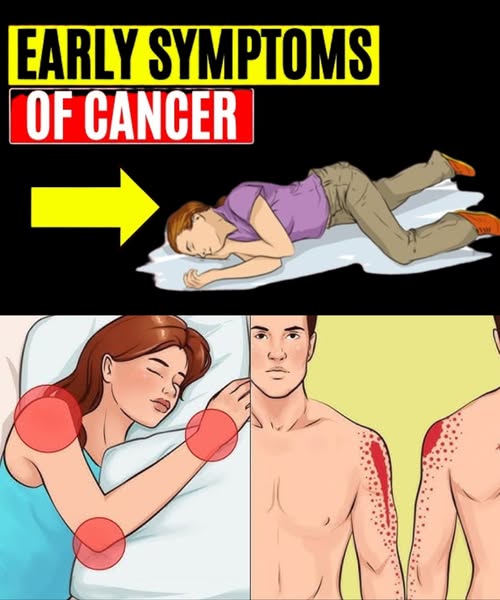Introduction
Cancer remains one of the leading causes of death worldwide, claiming over 10 million lives annually according to the World Health Organization (WHO). Yet, early detection can make a significant difference. Studies show that when caught in its early stages, many types of cancer are highly treatable and even curable.
The challenge is that early symptoms are often subtle, easy to dismiss, or mistaken for everyday health issues. Recognizing these red flags could save your life—or the life of someone you love.
In this article, we’ll reveal 12 early symptoms of cancer you should never ignore, explain why they matter, and answer frequently asked questions to give you actionable steps for prevention and awareness.
1. Unexplained Weight Loss
If you suddenly lose more than 10 pounds without dieting or increasing exercise, it may be an early warning sign of cancers such as pancreatic, stomach, esophageal, or lung cancer. While stress or thyroid problems can also cause weight loss, unexplained and rapid loss should not be ignored.
👉 Action Tip: Keep track of your weight monthly. If you lose weight unexpectedly, consult your doctor for a full evaluation.
2. Persistent Fatigue
We all feel tired sometimes. But when exhaustion doesn’t go away even after rest, it could be more than just stress. Persistent fatigue is often linked to cancers such as leukemia, colon, or stomach cancer.
👉 Action Tip: If fatigue disrupts your daily activities for weeks without a clear cause, schedule a check-up and ask about blood tests.
3. Unusual Lumps or Swelling
A new lump in the breast, testicle, lymph nodes, or under the skin could signal cancer. Not all lumps are malignant, but they should never be ignored. Early detection of breast or testicular cancer significantly improves survival rates.
👉 Action Tip: Perform self-exams regularly and schedule annual medical checkups for early detection.
4. Chronic Pain
Pain that persists and doesn’t respond to typical treatments can be a red flag. Back pain may indicate ovarian or colon cancer, while headaches that don’t improve could be linked to brain tumors.
👉 Action Tip: Keep a pain diary noting frequency, location, and severity. Share it with your healthcare provider for proper evaluation.
5. Changes in Skin
Skin cancer is one of the most common cancers globally. Watch for:
- New moles
- Changes in existing moles (size, shape, color)
- Unhealed sores
- Dark streaks under nails
👉 Action Tip: Use the ABCDE method: Asymmetry, Border irregularity, Color variation, Diameter larger than a pencil eraser, and Evolving changes. Seek medical advice immediately if you notice any.
6. Persistent Cough or Hoarseness
A cough that lingers beyond three weeks, hoarseness, or difficulty swallowing could point to lung, throat, or thyroid cancer.
👉 Action Tip: If you’re not sick but experience these symptoms continuously, request imaging or further testing from your physician.
7. Abnormal Bleeding
Unexplained bleeding is a major red flag. Examples include:
- Blood in stool (colon cancer)
- Blood in urine (bladder or kidney cancer)
- Coughing up blood (lung cancer)
- Unusual vaginal bleeding (cervical or uterine cancer)
👉 Action Tip: Report any abnormal bleeding immediately—delays can reduce treatment success rates.
8. Changes in Bowel or Bladder Habits
Persistent constipation, diarrhea, or changes in stool size/shape may suggest colorectal cancer. Similarly, frequent urination, pain, or incontinence may indicate bladder or prostate cancer.
👉 Action Tip: Track bathroom habits. If unusual changes last more than 2 weeks, consult your doctor.
9. Difficulty Swallowing
Trouble swallowing, pain while eating, or food getting “stuck” could signal cancers of the throat, esophagus, or stomach.
👉 Action Tip: Don’t ignore swallowing problems. An endoscopy or imaging test can detect potential causes early.
10. Unexplained Fever
Fever that lingers without infection may indicate cancers like lymphoma or leukemia. Cancer-related fevers often occur at night and may be accompanied by night sweats.
👉 Action Tip: Monitor your temperature. If fever persists without clear infection, request a complete blood count.
11. Night Sweats and Drastic Changes in Body Temperature
Severe night sweats that soak your clothes or sudden hot flashes not linked to menopause could be cancer-related. They’re commonly seen in blood cancers.
👉 Action Tip: Keep a symptom journal. Persistent or extreme sweating should prompt immediate medical evaluation.
12. Non-Healing Sores or Oral Changes
A sore in the mouth that doesn’t heal, white patches, or unusual bleeding could be oral cancer. Smokers and heavy drinkers are at higher risk.
👉 Action Tip: Maintain dental checkups every six months. Dentists often detect early oral cancers.
Frequently Asked Questions (FAQs)
1. Are these symptoms always signs of cancer?
No. Many of these symptoms can be caused by other conditions. However, the key is persistence—if symptoms don’t improve within a reasonable time, see a doctor.
2. Who is at higher risk of cancer?
- People with family history of cancer
- Smokers or heavy drinkers
- Individuals exposed to toxins or radiation
- Those with poor diet or sedentary lifestyle
3. How can I lower my risk of cancer?
- Eat a diet rich in vegetables, fruits, and whole grains
- Exercise regularly
- Avoid smoking and limit alcohol
- Protect skin from sun exposure
- Schedule regular screenings (mammograms, colonoscopies, Pap smears, etc.)
4. How effective is early detection?
According to the American Cancer Society, survival rates increase by up to 90% when cancer is diagnosed at Stage 1, compared to later stages.
5. Should I panic if I experience these symptoms?
No. Stay calm but take action. Early medical evaluation is key—it could either rule out cancer or lead to timely treatment.
Conclusion
Cancer doesn’t always strike without warning. The body often sends signals long before the disease becomes life-threatening. By learning to recognize these 12 early symptoms of cancer, you empower yourself with the knowledge to take action early.
Remember:
- Don’t ignore persistent symptoms.
- Don’t self-diagnose.
- Do seek medical evaluation promptly.
Awareness, vigilance, and regular check-ups are powerful tools in the fight against cancer. Share this article with family and friends—it might just save a life.
💡 Final Takeaway: Your health is your greatest investment. Don’t wait for symptoms to worsen. The earlier cancer is detected, the higher your chance of survival.



